Posted by: Northwest Eye in General on September 19, 2025
Overview
Macular degeneration can significantly impair your vision, and we understand how concerning this can be. While it does not directly lead to total blindness, it often results in substantial vision loss, particularly affecting your central vision, which can impact daily activities. It’s common to feel overwhelmed by these changes.
The article highlights that:
- While the dry form of this condition is more common,
- The wet form is responsible for a majority of legal blindness cases.
This emphasizes the importance of early detection and lifestyle modifications to help manage the progression of the disease. We are here to help you through this process and encourage you to seek care and support.
Introduction
Age-related macular degeneration (AMD) is a leading cause of vision impairment, particularly among older adults. We understand that this raises critical concerns about the potential for blindness. This article delves into the complexities of macular degeneration, exploring the two primary types—dry and wet—and their impact on vision. We will also discuss the latest treatment options and lifestyle modifications that can help manage the condition.
With the stakes high, especially for those at risk, one pressing question remains: can macular degeneration truly lead to blindness, or are there effective strategies to mitigate this risk? We are here to help you navigate this journey.
Define Macular Degeneration
Age-related retinal deterioration (AMD) is a progressive eye condition that affects the central area of the retina, which is crucial for clear, detailed sight. We understand that this condition primarily impacts older individuals and raises the question of whether does cause blindness, leading to significant vision loss, particularly in activities requiring fine detail, such as reading or recognizing faces.
There are two main types of retinal deterioration: dry and wet, each with its own characteristics and progression patterns. The dry form is the most common, accounting for approximately 90% of diagnosed cases. In contrast, the wet form, which develops from the progression of dry AMD, leads to the concern of whether macular degeneration does cause blindness, as it is responsible for about 90% of legal blindness cases. Recognizing and understanding this condition is vital, especially when considering the question of whether macular degeneration does cause blindness, as it is one of the leading causes of vision impairment in those over 50 years of age.
Diagnostic assessments, including dilated eye examinations and visual acuity evaluations, are essential for detecting and monitoring retinal decline. Recent advancements in treatment options, such as the approval of therapies for advanced dry macular deterioration in 2023 and innovative red light therapy, bring hope for better management of this condition. We also acknowledge the emotional toll that sight loss can take, as highlighted by psychologist Ed McDaniel, stressing the importance of support and understanding for those affected.
Moreover, lifestyle factors, such as maintaining a healthy diet and weight, play a significant role in eye health. Incorporating insights from experts like Dr. Brian McKay and Dr. Murray Brilliant can further enhance our understanding and lend credibility to the information shared. We are here to help you through this process, ensuring you feel supported and informed every step of the way.
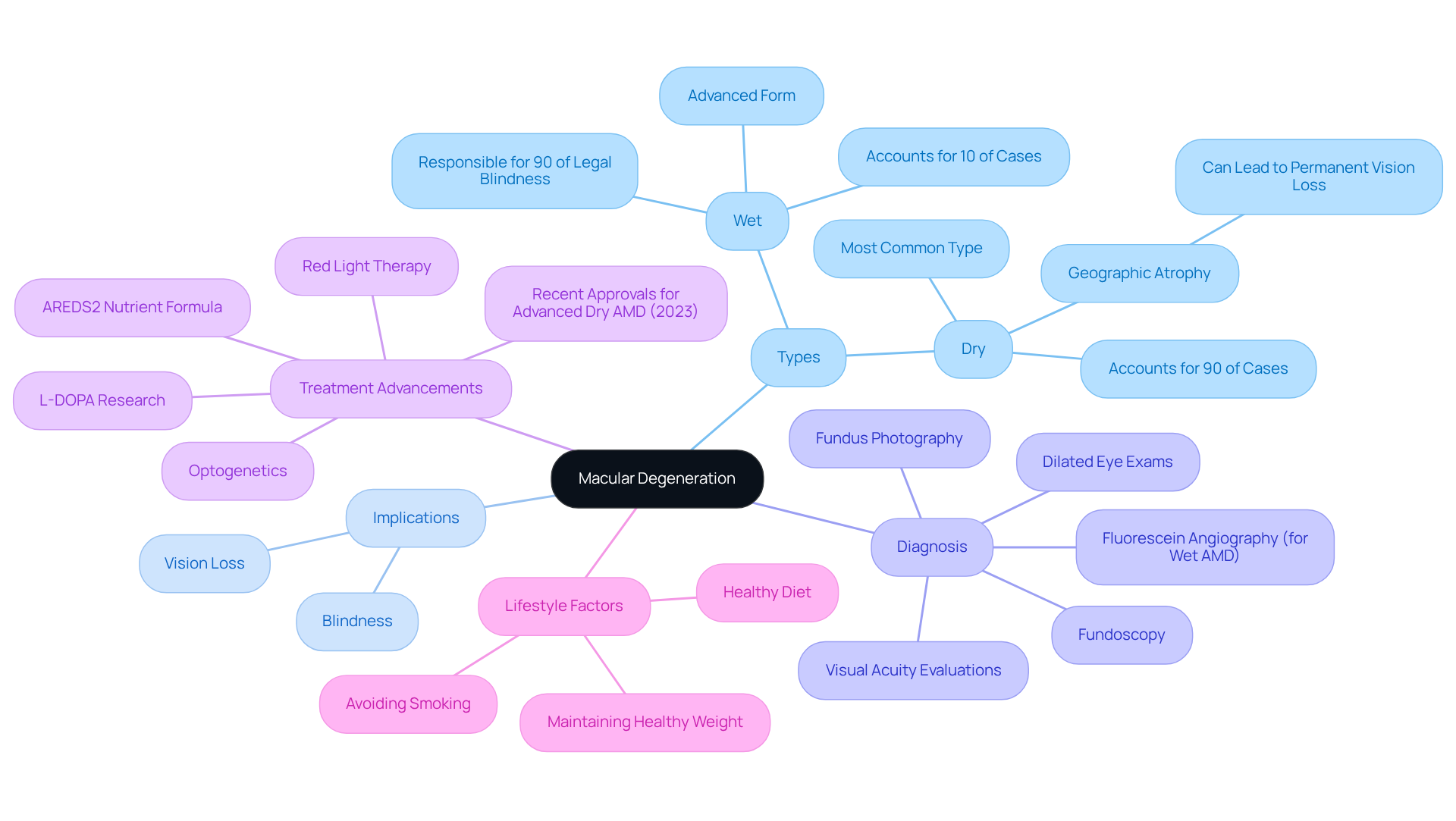
Explore Types and Stages of Macular Degeneration
Macular deterioration is mainly categorized into two types: dry and wet. We understand that facing these conditions can be concerning.
Dry age-related macular degeneration (AMD) is the more common type, characterized by a gradual thinning of the macula, which results in a gradual deterioration in sight. This condition progresses through three stages:
- Early
- Intermediate
- Advanced
In the early stage, there may be no noticeable symptoms, while the intermediate stage can present mild changes in eyesight. The advanced stage can lead to significant sight impairment, which raises concerns about whether macular degeneration does cause blindness.
, though less common, is more severe and occurs when abnormal blood vessels develop beneath the retina, leaking fluid and causing rapid vision loss. It’s important to note that this kind of retinal deterioration, which raises the question of whether macular degeneration causes blindness, represents about 10% of instances but is accountable for 90% of legal blindness. Understanding the distinctions between these types and their respective stages is crucial for early detection and timely intervention, which can greatly influence patient outcomes.
Recent research highlights the importance of regular eye exams, especially for individuals over 40. We understand that early AMD often presents no symptoms, making these exams vital. Retinal specialists emphasize that lifestyle modifications, such as maintaining a healthy diet, avoiding smoking, and regular exercise, can help manage the risk of progression. For instance, a specific high-dose formula of antioxidant vitamins and zinc may delay the advancement of intermediate AMD to the late stage.
Moreover, current research is investigating novel therapies, including gene treatments and surgical methods, intended to enhance results for individuals impacted by both dry and wet types of retinal deterioration. We are here to help you through this process, and resources such as videos, flyers, and booklets on AMD are available to support patient education and understanding.
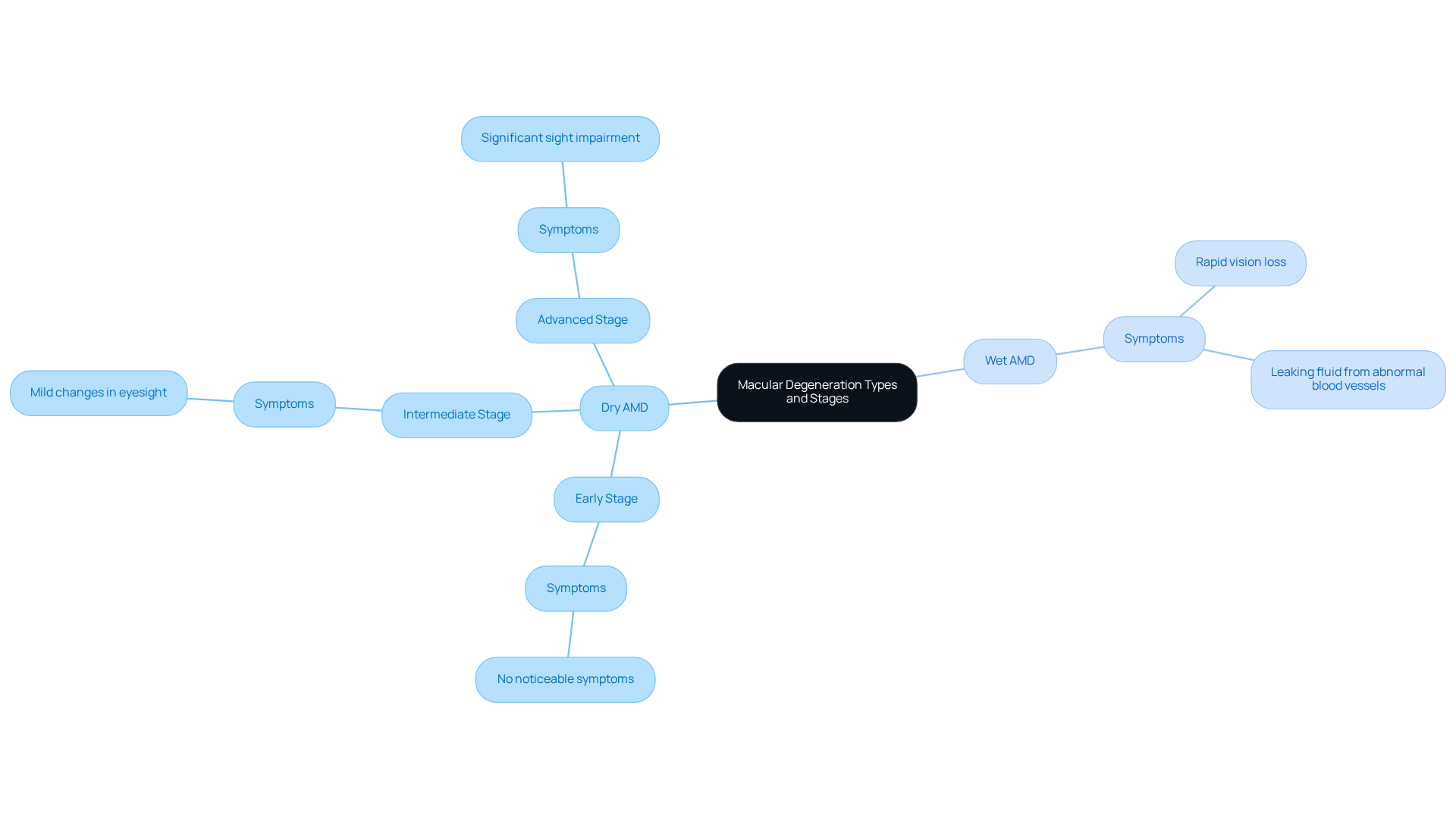
Identify Symptoms of Macular Degeneration
Symptoms of macular degeneration can vary depending on the type and stage of the disease, leading to questions about whether macular degeneration does cause blindness. We understand that experiencing changes in your vision can be concerning. Common signs include:
- Blurred or distorted eyesight
- Challenges with sight in dim lighting
- Gradual decline in central vision
- Observing a dark or vacant space in central sight
It’s common to feel worried if you observe these symptoms, as you might wonder, does macular degeneration cause blindness?
It is vital to identify these symptoms early to understand if macular degeneration causes blindness. We want to reassure you that can assist in slowing the progression of the illness, which is important to understand when considering whether macular degeneration causes blindness and how to help maintain your existing sight. If you encounter any troubling symptoms, such as blurred vision, we encourage you to seek professional medical assistance promptly. Remember, you are not alone in this journey, and we are here to help you through the process.
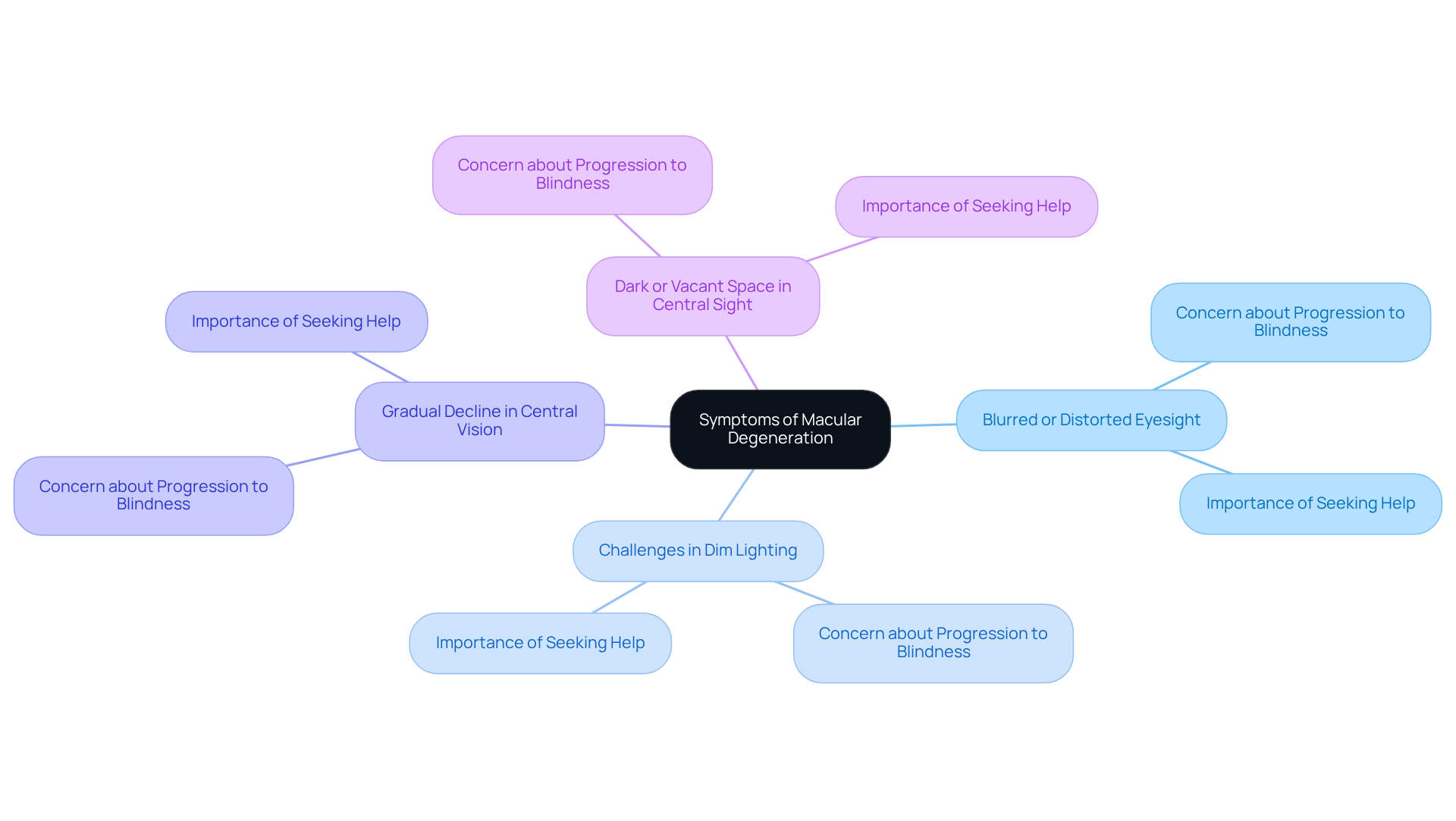
Assess Risks of Blindness from Macular Degeneration
While does not cause blindness, it can significantly impair your sight and interfere with daily tasks. We understand that the thought of experiencing severe sight loss raises the concern of whether macular degeneration causes blindness, which can be daunting, especially as the likelihood increases with age, a family history of the condition, and lifestyle choices like smoking and poor dietary habits. Recent studies indicate that about 15% of individuals diagnosed with dry age-related AMD may progress to the wet type, leading to the question of whether macular degeneration does cause blindness, as this type carries a higher risk of significant eyesight loss. It’s important to note that there is currently no treatment for late dry AMD, which highlights the critical importance of early detection and regular eye examinations.
Lifestyle factors play a vital role in the progression of AMD. If you adopt healthier habits—like quitting smoking, engaging in regular physical activity, and maintaining a nutritious diet—you can significantly lower your risk of developing advanced stages of the disease. According to the National Eye Institute, “Eating healthy, getting regular exercise, and quitting smoking can also help.” Real-world examples show that those who prioritize their eye health through lifestyle modifications often experience a slower progression of AMD. This reinforces the importance of preventive measures and regular monitoring.
Additionally, having late AMD in one eye increases the risk of developing it in the other eye. This underscores the need for vigilance in your eye care. Support options, such as low sight devices and rehabilitation services, are also available to assist individuals coping with sight loss due to AMD. Remember, we are here to help you through this process and ensure you have the support you need.
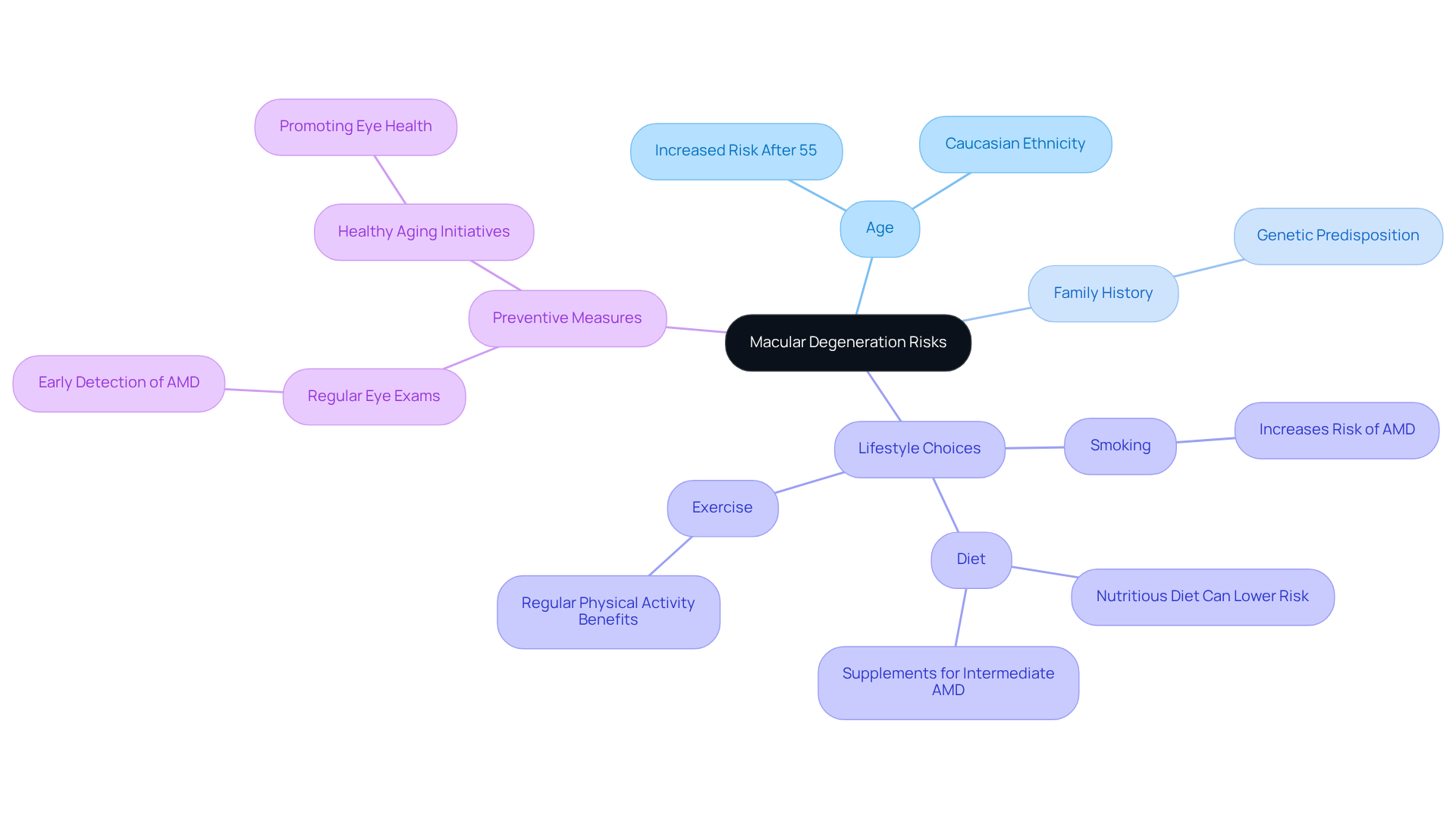
Review Treatment Options for Macular Degeneration
Treatment options for macular degeneration, and whether , can feel overwhelming, as they vary significantly based on the type and stage of the disease. For those facing dry AMD, we understand that the absence of FDA-approved treatments may be concerning. However, lifestyle modifications can play a crucial role in slowing its progression, which leads to the important question: does macular degeneration cause blindness? A diet rich in antioxidants, regular exercise, and smoking cessation are recommended strategies that can positively impact eye health. Studies suggest that individuals who adopt these lifestyle changes may experience a slower progression of the disease, offering a glimmer of hope.
On the other hand, wet AMD is frequently managed with anti-VEGF injections, which leads to concerns about whether macular degeneration does cause blindness. We want you to know that these injections have demonstrated their ability to effectively decrease fluid leakage and maintain sight, which is important in understanding if macular degeneration does cause blindness. Research indicates that these injections can lead to significant improvements in visual acuity, prompting the inquiry of whether macular degeneration does cause blindness, with some studies reporting an average increase of 5 to 10 letters on the eye chart after treatment. Additionally, low vision rehabilitation services are available to help individuals adapt to vision loss, leading to questions about whether macular degeneration does cause blindness and enhancing their quality of life.
Looking ahead, we are excited about emerging therapies, such as gene therapy and stem cell treatments, while also considering the question of whether macular degeneration does cause blindness. Promising results are expected in 2025, and these advancements may offer new hope for patients managing macular degeneration. Remember, we are here to help you through this process, and you are not alone.
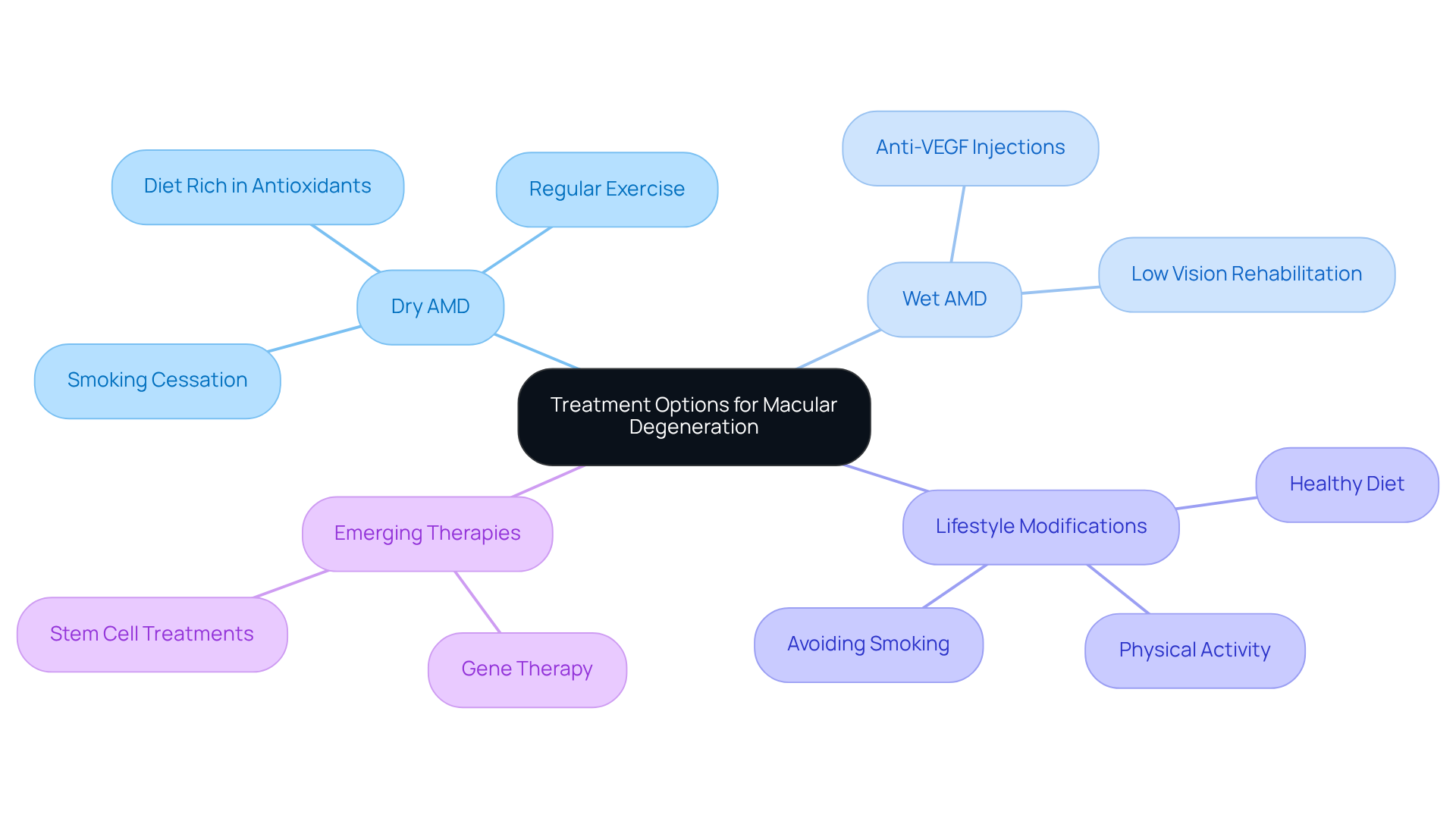
Conclusion
Macular degeneration is a progressive eye condition that primarily affects older adults, posing significant risks to central vision without directly causing blindness. We understand that navigating this condition can be daunting, but recognizing its two main types—dry and wet AMD—highlights the importance of early detection and intervention. While macular degeneration can lead to severe vision impairment, proactive management through lifestyle changes and available treatments can help mitigate its impact.
Key insights from the article emphasize the critical role of:
- Regular eye examinations
- Awareness of symptoms
- The significance of lifestyle factors in managing the risk of progression
It’s common to feel overwhelmed, but with advancements in treatment options, such as anti-VEGF injections for wet AMD and promising emerging therapies, there is hope for improved outcomes for those affected. Furthermore, support systems and rehabilitation services are essential for individuals navigating the challenges associated with vision loss.
Ultimately, raising awareness about macular degeneration and its implications is vital for fostering understanding and encouraging preventive measures. By prioritizing eye health and seeking timely medical advice, individuals can take significant steps toward preserving their vision and enhancing their quality of life. We are here to help you through this process, and with the right knowledge and support, it is possible to navigate the journey of macular degeneration successfully.
Frequently Asked Questions
What is macular degeneration?
Macular degeneration, specifically age-related macular degeneration (AMD), is a progressive eye condition that affects the central area of the retina, crucial for clear and detailed vision. It primarily impacts older individuals and can lead to significant vision loss, particularly in activities that require fine detail, such as reading or recognizing faces.
What are the two main types of macular degeneration?
The two main types of macular degeneration are dry and wet AMD. The dry form is the most common, accounting for about 90% of cases, while the wet form, which develops from the progression of dry AMD, is responsible for approximately 90% of legal blindness cases.
How does macular degeneration affect vision?
Macular degeneration can cause significant vision loss, particularly affecting the ability to see fine details. The advanced stage of the condition can lead to severe sight impairment and raises concerns about potential blindness.
What are the stages of dry age-related macular degeneration?
Dry AMD progresses through three stages: early, intermediate, and advanced. In the early stage, there may be no noticeable symptoms. The intermediate stage can present mild changes in eyesight, while the advanced stage can lead to significant sight impairment.
What causes wet AMD and how does it differ from dry AMD?
Wet AMD occurs when abnormal blood vessels develop beneath the retina, leaking fluid and causing rapid vision loss. Although it is less common than dry AMD, it is more severe and accounts for a significant proportion of legal blindness cases.
How is macular degeneration diagnosed?
Diagnostic assessments for macular degeneration include dilated eye examinations and visual acuity evaluations, which are essential for detecting and monitoring retinal decline.
What recent advancements are there in the treatment of macular degeneration?
Recent advancements in treatment options include the approval of therapies for advanced dry macular degeneration in 2023 and innovative red light therapy, which offer hope for better management of the condition.
What lifestyle factors can help manage the risk of macular degeneration?
Maintaining a healthy diet, avoiding smoking, and engaging in regular exercise are important lifestyle factors that can help manage the risk of progression of macular degeneration. Specific high-dose formulas of antioxidant vitamins and zinc may also delay the advancement of intermediate AMD to the late stage.
Why are regular eye exams important for individuals over 40?
Regular eye exams are crucial for individuals over 40 because early AMD often presents no symptoms. Early detection through these exams can lead to timely intervention, greatly influencing patient outcomes.
What resources are available for individuals affected by macular degeneration?
Resources such as videos, flyers, and booklets on AMD are available to support patient education and understanding, helping individuals feel informed and supported throughout their journey.






